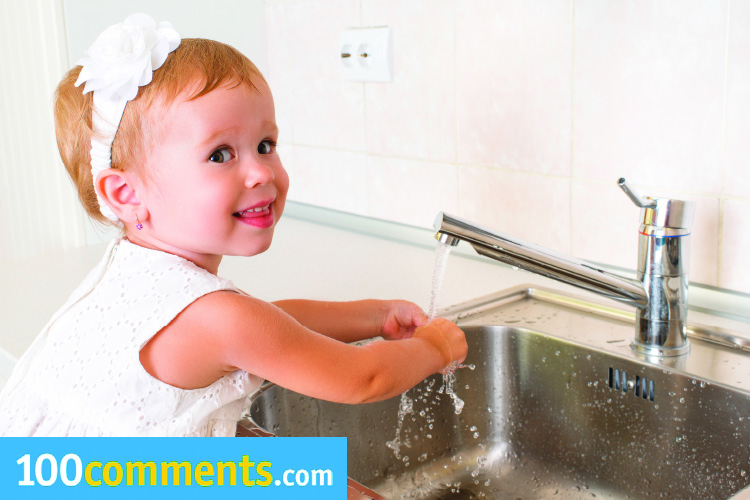Little kids seem to have the knack of getting dirty in any given situation, even in their sleep! Sooner or later, the time will have to come, when parents have to teach their toddlers about cleanliness and personal hygiene so that they will be able to ward off germs and bacteria that cause illnesses.
Table of Contents
Starting with the basics
When it comes to teaching a toddler anything at all, the best way is to lead by example. Follow through the same guidelines you set for your child, such as cleaning your teeth as often as you want him to and washing your hands after you’ve used the toilet or played with the family pet. Basically, practice what you want your child to follow.
At two or three years of age, toddlers cannot be entirely in charge of their personal hygiene but if you do the groundwork now and instill in your little one the virtues of cleanliness, you can be sure that you’re paving the path to good hygiene habits!
The forefront of hygiene: Hand-washing!
Our hands touch and transfer germs from one point to another all the time. Teaching a toddler the importance of washing his or her hands, and also the important times to wash their hands, will go a long way in improving their overall health! The following tips may help:
01. Clean – before & afterward
Little ones are not naturally inclined to keep their hands clean, so you can begin by ensuring they wash their hands after going to the bathroom, coming in from anywhere outdoor and also after playing with pets. Also, make them wash their hands before each meal or snack.
02. Sing and wash
Have your toddler sing his or her favourite nursery rhyme while lathering up during hand-washing time. This will help ensure that the little one will wash long enough to remove all dirt, grime and germs.
03. Make it fun!
Toddlers are more likely to wash their hands willingly if they like their hand soap. Look for kid-friendly scents and a fun dispenser. If they love to dig in the dirt, buy a gentle nailbrush to keep those fingers truly clean and germ-free.
Toilet hygiene tips
04. Teach the art of wiping
When it comes to wiping after using the toilet, it’s always a good idea to do an “once-over” afterward, even if you’ve already taught your toddler to wipe him or herself with the bathroom tissue. (Teach girls to always wipe from front to back to prevent fecal germs from infecting the vagina or bladder.)
Note: Toilet training is a lot easier if you use a special potty seat, whether self-contained, or one that fits over the top of an adult toilet seat.
05. Wet Tissue cleaning
Toddler bowel movements can sometimes get messy. Use disposable wipes instead of toilet tissue on ‘messy’ occasions, to add an extra level of cleanliness.
06. Don’t make a big deal out of poo
Funny toilet jokes aside, resist behaving as though bowel movements are disgusting. Toddlers may become anxious or even ashamed of having to poo, which could lead to problems down the road. Teach your child that passing motion is an essential bodily function but that poop contains germs, so we always wash our hands thoroughly afterward (after peeing, too).
Bath time tips
07. Teach kids the proper names for their body parts
Little ones should know the correct names of all their body parts and this includes their private parts too. This is important so they can express themselves effectively if they experience any irritation or pain. By itemizing the parts of their genitals and rectum, you can also help ensure proper washing habits in the bathtub by reminding them of each part to wash. Make sure to also teach your child to rinse thoroughly to prevent rashes.
08. Encourage hair washing
It’s almost an universal phenomena, but toddlers who enjoy washing their hair are few and rare. The phobia of water running down their heads together with the possibility of stinging their eyes are to blame. Half this dilemma can be addressed by using a tear-free shampoo which does not irritate or sting the eye. You can also try letting them have a bath toy with them during bath times so they have something to distract themselves with while you wash and rinse.
09. Keep hair neat
Coach toddlers to brush their own hair morning and night to prevent knots. A good detangling shampoo or conditioner will make the process easier and more pleasant. Use a soft hair brush which is gentle enough for delicate hair.
10. Oral care
This is one area of hygiene that you will truly have to lead by example. Teaching a child to brush his or her own teeth regularly will become much easier if the little one sees mummy or daddy do it religiously.
















